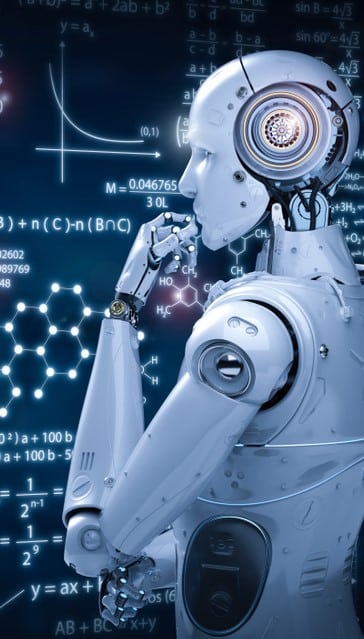Artificial Intelligence (AI) is intelligence exhibited by machines. In Computer Science, AI research deals with how to create computers that are capable of intelligent behavior. AI has been defined in numerous ways, but in general, it can be described as a way of making a computer system “smart” – able to understand complex tasks and carry out complex commands. The principal benefit of AI is that it can help humans make better decisions by providing insights and recommendations informed by data. Brush up your AI skills with an introduction to artificial intelligence before we move any further.
AI has several applications and is being employed in a growing number of industries, including healthcare, finance, manufacturing, and transportation. Some of the most remarkable applications of AI are in the field of robotics, where AI is used to create machines that can carry out complex tasks. Another common application is fraud detection, where AI is used to identify patterns of behavior that may indicate fraud. AI is also being used to create digital assistants, including Apple’s Siri, Amazon’s Alexa, and Google’s Assistant. They can help you with tasks such as scheduling appointments, booking flights, and shopping online.
Consequently, there is a significant demand for AI across different industries. According to a report by Gartner, AI’s global revenue was $51.5 Billion in 2021 and witnessed a growth of 14.1% from 2020. AI is forecast to reach $62.5 Billion in 2022 at a Compound Annual Growth Rate (CAGR) of 21.3% during 2021-2022. Fortune Business Insights stated that the global AI market could rise to $360 Billion by 2028 at a CAGR of 33.6% during the projection period 2021-2028.
Foundations of AI are undoubtedly playing a significant role in multiple industries. Thus, the demand for AI skills will only increase in the future as businesses continue to realize the benefits that these skills can offer.
Without much further ado, let’s explore the most in-demand skills in Artificial Intelligence the recruiters are looking for in their organizations.
Top Skills in Artificial Intelligence
There is a lot of enthusiasm around the AI skills required to succeed in your AI career path. So, what are the critical skills required to pave your successful AI Engineer career path? They are as follows:
Programming Skills
An AI aspirant must be able to comprehend sound programming languages, especially in Python, Java, R, C++, JavaScript, and others. Each programming language has its own specifications to understand and employ in AI as well as Machine Learning.
Probably the most in-demand skills for AI are critical thinking and problem-solving. It is not good enough to be knowledgeable in coding language and programming. People involved in AI need to look at problems and break them down into individual components so they can solve smaller problems. When these smaller problems are solved, their goals are achieved.
Paul Stein,
CEO of Trusted House Painter
Python is widely used in AI and machine learning due to its simplicity, code reliability, and faster execution. It will help you write complex algorithms and requires minimal code. It comes with many pre-made libraries for advanced computing and scientific computation.
Java is also used extensively in AI application development for implementing mappers and reducers, intelligence programming, genetic programming, search algorithms, neural networks, ML solutions, and more.
You need R for statistical computation, numerical analysis, machine learning, neural networks, and more. R allows you to collect and organize data sets, apply ML and statistical functions, and use matrix transformations and linear algebra for data processing.
The good old C++ is used in AI to enable procedural programming and manipulating hardware resources. You can use it to develop operating systems, browsers, and video games. Its flexibility and object-oriented functions make it highly useful in AI.
Adam Ng,
CEO and Founder of Trusted Malaysia
Pro Tip: Python is the most sought-after programming language in the 21st Century, and several individuals looking for a career in AI seek to learn Python. Worry not! Check out our free Python course and pave the way for your AI career path.
Libraries and Frameworks
There are a diverse range of libraries and frameworks to choose from when developing Artificial Intelligence applications. Some popular libraries and frameworks include NumPy, Keras, TensorFlow, Matplotlib, Seaborn, and many more. They are utilized for exploring enormous data sets, scientific computing, numeric operations, etc.
One of the latest in-demand AI skills is having an intricate knowledge of different libraries and frameworks relevant to AI, such as NumPy, Apache Spark, and TensorFlow. Understanding these platforms will allow you to write code faster and more accurately for AI applications.
Anyone hoping to make a start in AI or make a career shift into the space should be intimately familiar with subject matter like machine learning, neural networks, and deep learning as well as the various frameworks and libraries (like TensorFlow and NumPy) available to them. Stand-out applicants will also possess domain knowledge in the form of industry-specific insights and a naturally curious mindset.
Pro Tip: Do you want to understand more about Python libraries for Artificial Intelligence and Machine Learning? Then, we highly suggest enrolling in our free Python libraries course! This course will teach you several fundamentals about Python libraries, such as NumPy, Pandas, Matplotlib, and Seaborn.
Mathematics and Statistics
In order to create machines that can learn from experience, we need to program them with the ability to understand and reason. This is where Mathematics and Statistics come in. Mathematics is the study of patterns and relationships in numbers, and Statistics is the study of how to collect, analyze, and interpret data. Together, Mathematics and Statistics provide us with the tools we need to analyze and understand data.
Adam Ng, the CEO and Founder of Trusted Malaysia, again states that:
AI professionals work extensively on algorithms and applied mathematics. This is why you must have strong analytical and problem-solving skills along with mathematical knowledge so you can efficiently solve AI problems. Mathematical skills like linear algebra, statistics, probability, graphs, optimization techniques, etc., are desirable. You can utilize these skills to solve problems and create algorithms based on the requirements.
Statistical is another vital subject that you need to master if you want a bright career in AI and ML. It involves data collection, interpretation, and analysis. It coincides with data science, but you need statistical skills to understand the patterns.
Carlos Anchia, the Co-Founder and CEO of Plainsight, also states that:
Pros in the AI field need to call on extensive knowledge of various mathematical fields to create algorithms and solve for a company, industry, and problems worldwide. Top applicants and professionals likely excelled in subjects like statistics and linear algebra.
Machine Learning and Deep Learning
Machine Learning and Deep Learning are two of the most rapidly growing fields in Computer Science. They both involve training computers to learn from data without being explicitly programmed. Machine Learning is a discipline of computer science that gives computers the ability to learn from experience and adapt to new situations. Deep Learning is a subdomain of Machine Learning that uses Neural Networks to learn at a deeper level; Neural Networks are systems of interconnected processing nodes that can learn to recognize patterns of input data.
The information on ML is required in man-made reasoning as AI enables a PC or framework to act wisely. ML is a cycle that helps the machine to be smart and carry out its true capacity progressively errands and issues.
ML is utilized in different applications, including PC vision, email sifting, medication, discourse acknowledgment, and that’s only the tip of the iceberg. It is additionally connected with computational measurements to make precise expectations with the assistance of PCs. A portion of the ordinary instances of ML is web index ideas.
Adam Ng agrees to the same and continues:
Deep Learning is a branch of machine learning and data science that mimics how humans gain specific knowledge. It includes predictive analytics and statistics and leverages different layers to gain deeper features from a sound or image. With higher layers, detailing would be more nuanced. Deep learning can automate predictive analytics, and its algorithms are arranged in a hierarchy of increasing abstraction and complexity. Here, each algorithm implements a non-linear transformation to its input. Next, it uses its gained knowledge to create an output or statistical model. It will continue iterating until its output has achieved an accuracy of the accepted level. Thus, there will be many processing layers that data needs to pass through to be refined and accurate. Application: Deep learning has a wide application in various fields and is highly beneficial for data scientists in collecting, interpreting, and analyzing huge data volumes with ease and speed.
Ricardo Garza, the Director of Innovation and Emerging Tech at Softtek, adds:
The latest in-demand tech skills for AI include the following:
- Coding proficiency for AI/ML algorithms (Supervised, Unsupervised, Semi-supervised, and Reinforcement Learning)
- Ability to explain methods to mitigate the effects of overfitting and curse of dimensionality reduction
- Ability to identify an appropriate performance metric for evaluating machine learning algorithms/tools for a given problem
- Robust evaluation of multiple models
- Hyperparameter tuning
- AI deployment
- Cloud computing and Serverless
The candidate who can take on new challenges in the industry and possesses a continuous curiosity and excitement will be highly sought-after. These new challenges require a constant learning process to identify new trends and technologies as tools to develop solutions. While tech skills obviously have an impact on the success of the candidate, a broad knowledge of different subjects across industries can be helpful in the development of solutions beyond what has been done.
Pro Tip: The demand for Machine Learning is booming. Machine Learning can help businesses improve their products, services, and operations. To learn more about this cutting-edge technology, check out our Machine Learning course that encompasses the most crucial tools and techniques of this technology.
Natural Language Processing and Computer Vision
Natural Language Processing (NLP) is the study of how computers can understand and process human language. It involves tasks like understanding the meaning of words, parsing sentences into their component parts, and understanding the relationships between words. NLP can be used for a diverse range of tasks, such as automated translation, text summarization, and machine comprehension.
Computer Vision is the study of how computers can interpret and understand digital images. It includes tasks like identifying objects in images, recognizing facial features, and estimating the 3D geometry of objects in images.
Both NLP and Computer Vision are important subfields of AI with a range of applications.
Sam Sweeney, the Founder of Trivvy, agrees to the same and states that:
There are a number of in-demand skills required in the AI industry such as deep learning, reinforcement learning, computer vision, natural language processing, robotics, etc. These skills are required for implementing some of the most advanced algorithms in AI.
Jacob Gower, Cloud and AI Director at Technology Partners in St. Louis, continues:
This is largely dependent on the specific application because, with the ever-increasing breadth of AI, specialization becomes more important. The most in-demand areas are computer vision, optimization, deep learning, and neural networks, with these being, at times, overlapping (for example, a neural network architecture is commonly applied to computer vision problems). Additionally, most development takes place using libraries like TensorFlow and PyTorch, so familiarity with these is a must.
William Cannon, the CEO and Founder of Uplead, states a few tech goliaths using these skills:
AI technology is currently under research, which enables computers to think and make decisions like humans. Self-driving cars, natural language processing, and computer vision are some examples of AI technology that are being tested by many tech giants like Apple, Google, Microsoft, and Tesla.
Pro Tip: NLP and Computer Vision are vital for implementing various Artificial Intelligence applications. Learn in-depth concepts of these technologies by registering in our free tutorials on Natural Language Processing and Computer Vision.
If you want to become an NLP scientist, you need to have a passion for linguistics and computer science. NLP scientists use their knowledge of linguistics to develop algorithms that can analyze and interpret natural language data. They also work on developing new methods for teaching computers to understand and respond to human language.
Data Science and Data Analysis
Data is the lifeblood of businesses today. Both Data Science and Data Analysis are essential tools for understanding the world around us. They help us make better decisions, understand our customers and their needs, and track our progress and performance. They’re essential for businesses and organizations of all sizes and anyone who wants to make the most of their available data.
Every day, organizations process a massive amount of data. Many people are starting to realize the powerful insights and business gains that data can provide when properly exploited and examined. Because of data’s game-changing potential, demand for Data Analysts, Data Architects, Database Administrators, Business Analysts, Chief Data Officers, and other related professions is on the rise. Every year, the number of Data Scientist job vacancies rises by almost 50%.
He further continues about the application of data:
Developers of business intelligence are in high demand. Their key responsibility is to evaluate complex data and look for current business and market trends in order to improve the organization’s profitability and efficiency. They are experts in not only technical and analytical skills but also communication and problem-solving abilities. They are in charge of developing, modeling, constructing, and maintaining data for cloud-based data platforms that are complicated, vast, and highly accessible.
Eric McGee, Senior Network Engineer at TRGDatacenters, continues:
One major in-demand skill for AI practitioners is data quality management. AI practitioners need to be able to collect data and clean it before using it in AI modeling. Without this critical skill, the practitioner is running the risk of using erroneous data that will end up negatively impacting the quality of AI results. This can be disastrous in high-risk AI applications such as in healthcare.
William Cannon, the CEO and Founder of Uplead, also agrees and adds:
Data science, machine learning, and artificial intelligence (AI) are considered to be the most in-demand technologies used in almost every field from science, medicine, and business administration.
Pro Tip: Data Science is used in a wide variety of industries, from business to healthcare to government. The demand for Data Science is on the rise as more and more businesses realize the value of data. So, if you are looking for a high-paying career with a lot of opportunities, now is the time to make a move and enroll in the top-rated Data Science courses.
If you want to become an AI data analyst, you will need to have strong analytical and critical thinking skills. You will need to be able to understand complex data sets and be able to identify patterns and trends. You will also need to be able to communicate your findings to others in a clear and concise manner.
Soft Skills
Artificial Intelligence is advancing at a remarkable pace, and as it does, the need for soft skills will become increasingly important. Soft skills are not easily quantified or automated and include critical thinking, problem-solving, communication, and collaboration.
Employers are already starting to recognize the significance of soft skills in the age of Artificial Intelligence. In order to be successful in the age of Artificial Intelligence, employees will need to be able to use these skills to work collaboratively with computers and other employees.
Carlos Anchia, the Co-Founder and CEO of Plainsight, agrees to the same and states that:
Even in a world as technical as AI, so-called soft skills are as important as anywhere else. Qualities like creativity, persistence, decision-making, and communication skills will grow more and more important as AI and the very nature of the professional world continues to evolve. While technical skills will always prove important, intangibles like these can often make the difference between two equally-skilled candidates.
Matthew Emerick, AI Generalist and Educator at Cross Trained Mind, adds:
The second biggest skill is communication and the ability to communicate the strengths and weaknesses of using artificial intelligence as well as when not to use it.
Paul Stein, the CEO of Trusted House Painter, continues:
Probably the most in-demand skills for AI are critical thinking and problem-solving. It is not good enough to be knowledgeable in coding language and programming. People involved in AI need to look at problems and break them down into individual components so they can solve smaller problems. When these smaller problems are solved, their goals are achieved.
Pro Tip: If you are looking to future-proof your career, it is crucial to focus on developing your soft skills. Soft skills can be developed through training and education, and there are many soft skills courses available for free that can assist you in improving your skills.
Data Science, Artificial Intelligence, and Machine Learning are the top buzzwords in the IT industry these days. They are used in almost all industries and businesses, cutting across the domain. Companies are on the constant lookout for data science or AI experts that can increase their business and later manage the growth. But before we delve into the skills needed for each, let us briefly understand what each term means in the current context.
The top 5 skills needed to excel in the area of Data Science and Artificial Intelligence are as follows:
1. Python or R programming language
Python is the most command programming language used in DS/AI and ML domains. Its easy-to-use and open-source programming language with a wide user base and very detailed and constantly updated documentation. One can program, script, visualize, scientifically compute, and web scrape using Python. The data structures, modularity, and Object Orientation in Python are perfect for application development using data science. Data scientists use Python for various processes like creating financial models, web scraping data, creating simulations, web development, data visualization, and others. There is a well-tested package for almost any problem in Python.
R is another programming language widely used in the data science industry. R is more useful for data visualization and making decisions using graphical data. It is very easy to learn and is well documented. There are many free online resources to learn R. R is used as a prime data science programming tool in many industries like healthcare, e-commerce, banking, and others.
2. Cloud Computing
Almost all the major industries are moving from in-house servers to some form of cloud solution. Further, the applications are developed as a set of independent microservices that are deployed and run on the cloud. Cloud computing allows organizations to scale their IT framework according to the demands and save both operation cost and capital investment. All major DS programs are designed to build and run on the cloud efficiently. Major players such as Microsoft (Azure), Amazon (AWS), Google (GCP), and IBM (IBM Cloud) have their own commercial DS offerings running over cloud solutions.
Also Read: Top 6 Cloud Computing Projects to get you hired in 2023
3. Statistics and Mathematics
Statistics, Probability, and mathematics are the basis of Data Science, AI, and ML. One cannot design robust ML algorithms without having a strong foundation in these three fields. It is almost impossible to extract meaningful insights from unstructured data sets. Statistics is a must to do data sorting and analysis. Data scientists usually recommend one model from a collection of models after running various statistical tests on the result of each model to choose the best model. Moreover, many existing models such as NaiveBayes or Support Vector Machine (SVM) require knowledge of probability and mathematics to understand the underlying equations.
4. Artificial Intelligence
Artificial intelligence is usually employed to automate the data analytics systems and forecast more accurately. Data scientists can derive real-time actionable insights with AI that is well backed up with data. The objective behind AI is to permeate machines with human-like attributes to make them think, process, and act faster in a volatile market scenario. The application of AI has already made many manual jobs obsolete. AI finds wide application in Image processing, Natural language processing, computer vision, and numerous other fields.
5. Machine Learning
Machine learning algorithms are used by organizations to predict something or to classify and categorize. Firms need ML experts that can develop robust data analytics algorithms with accurate predictions with the least error. ML helps data scientists to extract meaningful insights based on various data matrices.
How can you upskill?
If you wish to leverage the power of Data Science, you can take up the Practical Decision Making Using Data Science course offered by Great Learning. The course is designed for mid & senior managers and business leaders and is in collaboration with NUS. It is a 6 months comprehensive program that covers a comprehensive curriculum. Upon successful completion, you will also receive a Certificate of Completion from NUS Business School. Register today, and power ahead!
Wrapping Up
The demand for AI skills is high as organizations recognize this technology’s potential to improve their operations. Those who are able to utilize AI skills effectively will be in high demand and will be able to find jobs in a variety of sectors. Additionally, those who can develop their own AI skills will be able to create new opportunities for themselves and their businesses.
If you are looking to upskill in AI, there are a number of ways to do so. Firstly, you can enroll in Artificial Intelligence course or specialize in a related field such as Computer Science or Mathematics. You can also attend coding boot camps that will teach you the basics of AI programming. Alternatively, you can join an AI-focused professional community or online forum, where you can learn from experienced professionals and discuss challenges and advances in the field.
The skills required for a career in AI are constantly evolving, so it is vital to stay contemporary with the latest trends and technologies. By developing your skills in this field, you will be well-positioned for a successful career in AI.









